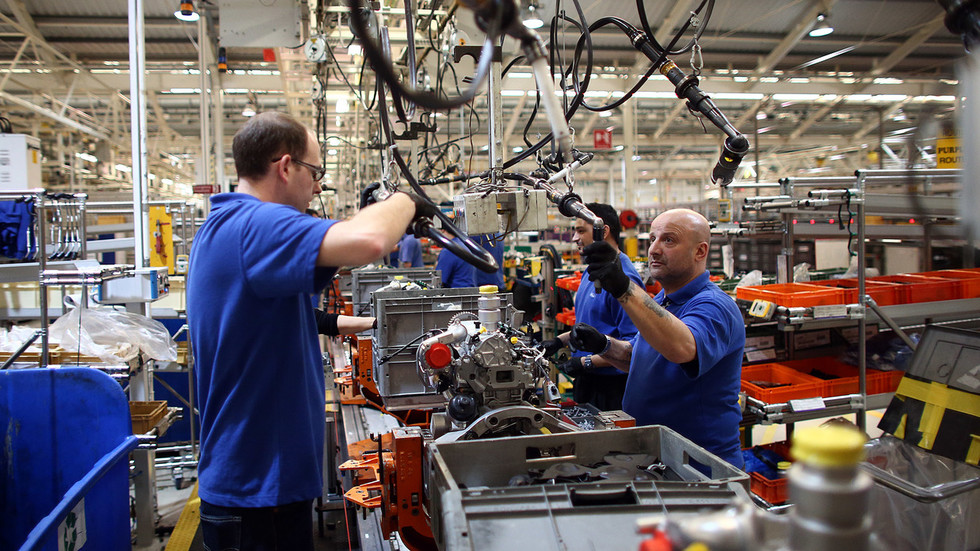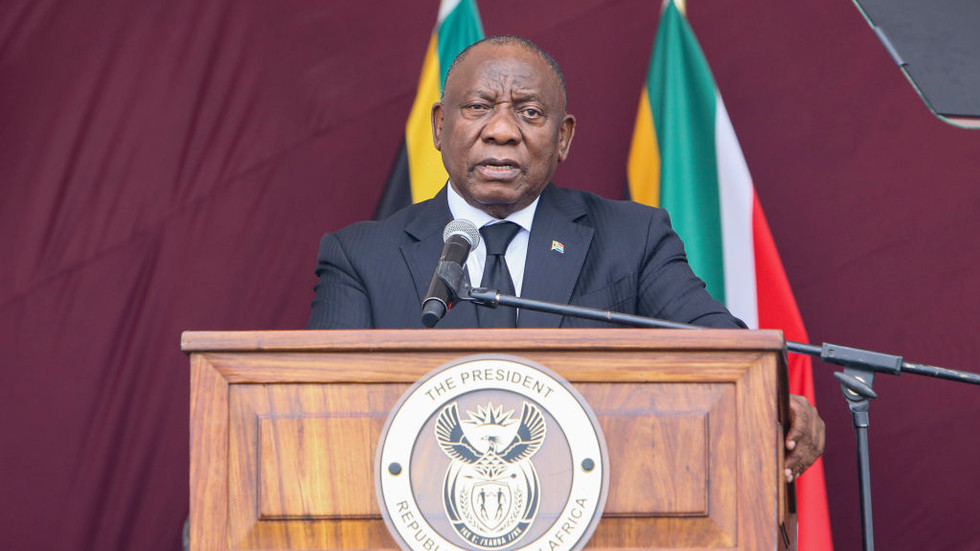What you need to know
- India has begun counting votes in the country's general elections
- The world's most populous nation went to polls in seven phases, over six weeks
- Preliminary results give Modi a comfortable lead, but his alliance appears unlikely to win by the landslide predicted by exit polls
-
BJP projected to suffer big losses in India's biggest state, Uttar Pradesh
Here are the latest developments in India's 2024 election on Tuesday, June 4:
06/04/2024June 4, 2024
Modi's Ram Temple bid has backfired — DW reporter
DW reporter Nimisha Jaiswal says the BJP came into the election with a lot of confidence, but "the tide seems to have turned during the course of voting."
Jaiswal suggested that the BJP picked up on a turn against them and that a shift towards more regional parties appeared to be benefiting the main opposition Congress party rather than the BJP.
The support for regional parties "may reflect that the fact that voters may be tired of the BJP to a certain extent," she said.
At the same time, voters "may not have gained full confidence back in the Congress," which once ruled India for decades but lost massively in the last two elections.
"Both the BJP and the Congress pulling these regional parties into their coalition is a smart move," Jaiswal said. "There are big gains for a southern regional party that the BJP will benefit from, but most of these benefits do seem to be accruing to the opposition."
This could result in the opposition preventing the BJP from "steamrolling policies through" as they were able to do previously, she added.
Regarding the major state of Uttar Pradesh, considered a "stronghold" for the BJP for the last 10 years, Modi's gamble on constructing the controversial Ram Temple appears not to have paid off, according to Jaiswal.
"The Uttar Pradesh populace seems very often to vote along religious lines, but it seems that the appeal the BJP was making through the construction of the Ram Temple does not seem to have pulled through as much — the city in which that temple was made, the BJP seems to be losing."
The BJP's anti-minority rhetoric used on the campaign trail also "seems to have backfired," Jaiswal said.
Newly built Hindu Ram temple exposes rift in Indian society
https://p.dw.com/p/4gceD
Skip next section Modi looks set to rely more heavily on his alliance according to tallies06/04/2024June 4, 2024
Modi looks set to rely more heavily on his alliance according to tallies
 While Modi looks set to secure a third term as prime minister, his parliamentary majority is on course to be lower than in 2019Image: Money Sharma/AFP/Getty Images
While Modi looks set to secure a third term as prime minister, his parliamentary majority is on course to be lower than in 2019Image: Money Sharma/AFP/Getty ImagesThe early trends from India's election vote tally have shown us that "the Indian vote remains pretty unpredictable," DW's bureau chief in Delhi Sandra Petersmann said.
"The exit polls were also seemingly far off the mark because they all had projected a thumping majority for the National Democratic Alliance (NDA) led by Prime Minister Narendra Modi's BJP," she added. "And that doesn't seem very likely at the moment."
Modi's alliance had been forecast to win a large majority, similar to the landslide it won in 2019. But based on the tallies after around half of the ballots had been counted, the alliance looked set to clear the threshold but without a landslide victory.
"If we look at the margin for a two-thirds majority — that would be around 359 seats, which would enable any alliance or party to change India's constitution — they're far from that as of now," Petersmann said.
The BJP will also now be more reliant on its alliance partners if the tally continues on its trajectory.
"If we look back at 2019, the BJP alone had won 303 seats. Right now the BJP alone is at 240 seats, so they have lost as a party individually," Petersmann explained.
"If we look at a state like Uttar Pradesh, with a population bigger than Brazil, it sends 80 members of parliament to the national parliament here in Delhi. In 2019, the BJP managed to win 62 of those seats, now it seems that they have lost about half of them — that is huge because Uttar Pradesh is in the northern Hindi heartland."
https://p.dw.com/p/4gcRt
Skip next section BJP lead narrower than predicted06/04/2024June 4, 2024
BJP lead narrower than predicted
DW correspondent Shalu Yadav says the mood at the headquarters of Modi's Bharatiya Janata Party (BJP) in New Delhi was a "reflection of the disappointing numbers" that have been coming in from vote counting centers.
Early trends show the BJP is falling short of a majority in the 543-member parliament.
When the party swept to power in 2014, it did so with a majority of its own. It repeated that success in the 2019 elections.
"The PM had made a claim of crossing 400 seats out of 543 this time during his election rallies, and as of now they are nowhere near as close," Yadav said.
She said talking to people on the ground over the past two months had made it clear unemployment, especially amongst the youth, was an important issue for voters, as well as inflation.
"Even as India is one of the world's fastest, major growing economies, here people say that hasn't really reflected onto their lives," Yadav said, adding that food and fuel costs have been rising.
"Unemployment remains a burning issue amongst the youth, as well as rural distress — farmers have been a major voting bloc and they have been quite disappointed with this government because they haven't been able to meet the promise of doubling incomes during their tenure."
https://p.dw.com/p/4gcay
Skip next section Opposition celebrates stronger than expected showing in polls06/04/2024June 4, 2024
Opposition celebrates stronger than expected showing in polls
As vote counting continues, early results show Prime Minister Narendra Modi's BJP-led alliance is unlikely to win by the landslide predicted by exit polls.
DW correspondent Adil Bhat said that had led to a mood of ''jubilation, excitement and anticipation" at the headquarters of Rahul Gandhi's opposition Congress party in the capital, New Delhi.
"Congress and its alliance partners, they don't have a majority right now, they are not even close. But for them it's a victory because they are able to stop BJP from getting a thumping majority," he said.
"Congress workers here are telling us that it's already a victory for them. It's a rejection of Prime Minister Modi's divisive politics and it's a win of Rahul Gandhi's catchphrase: save democracy and save the constitution ... They are saying that this kind of win will give them a morale boost, it will help them to make preparations better for the coming elections."
https://p.dw.com/p/4gcBL
Skip next section Turnout shows two-thirds of electorate voted06/04/2024June 4, 2024
Turnout shows two-thirds of electorate voted
Counting is well underway in India where around 642 million ballots need to be tallied.
This represents a turnout of 66.3%, with a total electorate of 968 million people — the largest in the world.
While this share was down slightly from the last election in 2019 when it reached 67.34%, election chief Rajiv Kumar on Monday called the turnout a "world record."
Some analysts have chalked up the lower turnout to the blistering temperatures that pummeled parts of the country during the drawn-out election, with the mercury reaching over 45 degrees Celsius (113 degrees Fahrenheit) in parts of northern India.
https://p.dw.com/p/4gcA5
Skip next section Early counting trends show Modi's BJP in lead06/04/2024June 4, 2024
Early counting trends show Modi's BJP in lead
The Bharatiya Janata Party (BJP) is leading in 243 of the total 543 seats, according to data published on the Election Commission of India's website roughly four hours after vote counting got underway.
The ruling party has also already won an uncontested seat from Surat, in the western state of Gujarat. The seat was unopposed after a Congress party candidate was disqualified over inconsistencies in the signatures of proposers, and eight other candidates withdrew before the elections.
A total of 272 seats are needed for a majority in parliament.
The initial figures give Modi's party a comfortable lead, but the opposition also appears to be performing better than expected.
The Election Commission does not release data on the percentage of votes tallied, but counting was to go on throughout the day and preliminary figures are expected to change.
https://p.dw.com/p/4gbyn
Skip next section Women voters expected to play key role06/04/2024June 4, 2024
Women voters expected to play key role
 Women make up nearly 49% of India's total electorateImage: Deepak Sharma/AP/picture alliance
Women make up nearly 49% of India's total electorateImage: Deepak Sharma/AP/picture allianceWomen in India are being seen as a crucial voting bloc in the marathon general elections with more of them voting in recent ballots than ever before.
Many poll analysts have said that they expect women to play a decisive role in determining the results for the 2024 election.
In their campaigns over the last month, political parties have tried to woo the female voter base with monthly cash handouts, subsidized cooking gas cylinders and low-interest loans.
Turnout has increased substantially in each recent major election. Of the women eligible to vote, 53% voted in 2004; 56% in 2009; 65.5% in 2014; and 67% in 2019.
Figures for 2024 are not yet available.
Indian election: Unlocking women's potential in politics
https://p.dw.com/p/4gbs7
Skip next section Indian markets fall after exit poll rally06/04/2024June 4, 2024
Indian markets fall after exit poll rally
Indian financial markets opened lower on Tuesday morning after closing the night before at all-time highs as exit polls indicated a comfortable win for Prime Minister Modi's Bharatiya Janata Party (BJP).
But with initial vote counting so far signaling a closer than expected contest between the BJP-led alliance and the opposition INDIA bloc, traders said the markets were selling off and investors were awaiting more clarity.
The country's benchmark indices — the NIFTY 50 and the BSE Sensex — both dived by more than 3%. The rupee also fell against the dollar and benchmark bond yields were up.
Modi's business-friendly policies have won him extensive support among India's corporations and industry.
Monday's surge in markets was fueled by optimism over the economic outlook under a fresh Modi-led government.
https://p.dw.com/p/4gbqG
Skip next section Chief election commissioner assures 'transparency'06/04/2024June 4, 2024
Chief election commissioner assures 'transparency'
 Election officials open an electronic voting machine to count votes at a counting center in New DelhiImage: Manish Swarup/AP/picture alliance
Election officials open an electronic voting machine to count votes at a counting center in New DelhiImage: Manish Swarup/AP/picture allianceThe counting of votes for all constituencies has begun, chief election commissioner Rajiv Kumar said while addressing the media from the Election Commission of India 's control room on Tuesday.
"Our teams are here in the control room to monitor the counting of votes virtually ... Our website has around 2 lakh hits per second. We are managing all of that from here," he said. Lakh is a unit measuring 100,000.
Kumar added that all election officials have been asked to allow the polling agents and candidates to sit there so that the "counting is conducted with transparency."
"Our central observers are present at each counting center who will certify the results of each round before declaring it. They are our eyes and ears. The candidates will inform the central observers if any problem arises. We will take immediate action if there is any complaint anywhere. We are continuously updating our website," he said.
https://p.dw.com/p/4gbiV
Skip next section Exit polls say Modi tipped to win06/04/2024June 4, 2024
Exit polls say Modi tipped to win
Almost all post-poll surveys on India's television news channels forecasted a landslide victory for Prime Minister Narendra Modi's Bharatiya Janata Party (BJP)-led National Democratic Alliance (NDA).
To win a majority, a party or a coalition needs to cross the 272-seat mark.
Most exit polls predicted 350-370 seats for the NDA and 107-140 for the Indian National Developmental Inclusive Alliance (INDIA), an umbrella bloc of opposition parties that have come together to fight the BJP.
In the 2019 general elections, the BJP won 303 seats.
"I can say with confidence that the people of India have voted in record numbers to reelect the NDA government," Modi wrote on social media platform X as the exit polls rolled out.
Opposition parties have dismissed the exit polls, which have in the past proved unreliable in India, by saying they were unscientific and did not reflect reality.
The 73-year-old Modi, who first came to power in 2014, is vying to be the second prime minister after India's independence leader Jawaharlal Nehru to win three consecutive terms.
Rahul Gandhi, Nehru's great-grandson, is a key leader representing the Indian National Congress in the opposition against Modi.
India witnessed a vitriolic campaign over the past month, with parties accusing each other of religious bias and of posing a threat to sections of the population.
With the BJP favoring a Hindu nationalist course, Modi is known for prioritizing Hindu interests.
Critics and the opposition have voiced fears that if reelected, he could try to change the constitution of the South Asian nation in order to further consolidate a Hindu nationalist agenda.
The BJP rejects this claim.
During his campaign, Modi accused the Congress party, which leads the INDIA bloc, of favoring the country's 200 million Muslims.
The INDIA alliance denied it favored Muslims in the Hindu-majority country.
Some have accused Modi of hate speech over comments he made about Muslims during the campaign, saying he may have violated the Model Code of Conduct (MCC) during elections, which is enforced by the Election Commission of India (ECI).
However, the body has been slow in taking action over the remarks.
India elections offer a look at the impact of 'deepfakes'
https://p.dw.com/p/4gbdR
Skip next section Vote count kicks off06/04/2024June 4, 2024
Vote count kicks off
Vote counting has begun in India’s mammoth general elections as exit polls on the weekend widely projected incumbent Prime Minister Narendra Modi easing into a third term.
The poll count of 642 million votes started at 8 a.m. local time (0330 UTC/GMT). Counting is taking place at centers in each of the 543 constituencies where polls were held and is likely to stretch into the evening.
"People should know about the strength of Indian democracy," chief election commissioner Rajiv Kumar said at a press conference, adding that there was a "robust counting process in place."
https://p.dw.com/p/4gbcY
Skip next section What happened in the world's largest democratic election?06/04/2024June 4, 2024
What happened in the world's largest democratic election?
Indians went to polls to elect their prime minister over a six week period that began on April 19.
The lengthy exercise was spread across seven phases, culminating with the last leg of voting on June 1.
With India being the world's most populous country, it was the world's largest general election.
Around 970 million voters, over 10% of the world's population, were eligible to cast their ballots in the election that was held amid a scorching heat wave with temperatures reaching nearly 50 degrees Celsius (122 degrees Fahrenheit) in some areas.
Election heat, too, soared in the last six weeks that saw an intense political battle for over 500 seats in the Lok Sabha — the lower house of India's Parliament.
Can Modi's BJP win over India's multicultural south?
dvv/rmt (AFP, AP, Reuters, dpa)
https://p.dw.com/p/4gbci

 5 months ago
25
5 months ago
25








